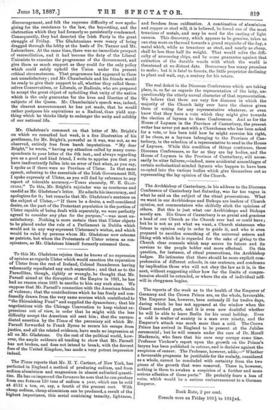Mr. Gladstone's comment on that letter of Mr. Bright's on
which we remarked last week, is a fine illustration of his gentleness, for Mr. Bright's, powerful as it was, was not, as we observed, entirely free from harsh imputations. "My dear Bright," he wrote, "having my attention called by many corre- spondents to your letter of the 6th inst., and always regarding you as a good and kind friend, I write to apprise you that you have inadvertently fallen into an error of fact when, as you say, I spoke as if there were no Province of Ulster. In that same speech, referring to the essentials of the Irish Government Bill, I spoke expressly of Ulster, as you will find by reference to any report of tolerable accuracy.—Yours sincerely, W. E. GLAD. STONE." To this, Mr. Bright's rejoinder was as courteous and candid as Mr. Gladstone's letter. He admits his inaccuracy, and apologises for it; but remarks that Mr. Gladstone's sentence on the subject of Ulster,—" If there be a desire, a well-considered desire, on the part of the Protestant population in the portion of Ulster capable of being dealt with separately, we were perfectly agreed to consider any plan for the purpose,"—was most un- satisfactory. Nothing is more certain than that Ulster objects to be placed under the rule of a Parliament in Dublin which would not in any way represent Ulstermen's wishes, and which would be ruled by persons whom Mr. Gladstone now esteems as patriots, but whom the Protestants of Ulster esteem as con- spirators, as Mr. Gladstone himself formerly esteemed them.


































 Previous page
Previous page